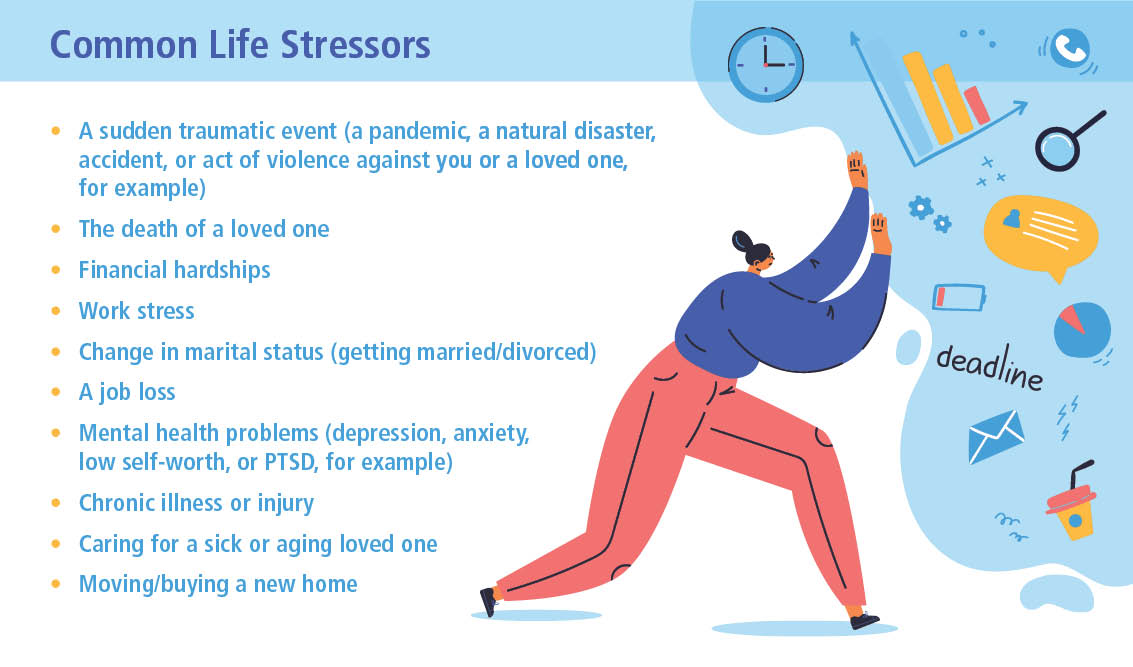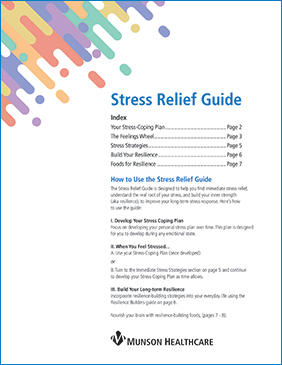The Key to Managing Stress

Stress happens to us all. A missed alarm throws off your morning. Unexpected bumper-to-bumper traffic when you're already running late. An extra-demanding work project. These life stressors probably won’t matter tomorrow, but in the throes of the moment they can cause us to feel as if our whole world is turning upside down.
And those are just the little things.
Coping with Ongoing Stress
When these minor bumps in the road become more frequent, or we're faced with stressful life situations that require more than changing shirts or finding an alternative route home, life can feel overwhelming. Common life stressors such as complicated work or family matters, losing a loved one, or coping with chronic injury or illness causes ongoing stress that feels difficult to manage.

We all face these common life stressors from time to time – and just like with our everyday stress – we respond. But the way we respond is very individual. Not only because of our unique personalities, but several other factors as well.
Five Factors That Influence How You React to Stress
The amount, intensity, or duration of your stress. This includes the number of life stressors occurring within the same time frame (for example: moving to a new home or city, followed by the death of a parent), the severity of your stress, and how long it lasts.
External/environmental determinants. Socio-economic factors, such as ethnicity and income level, whether you have emotionally supportive relationships, your lifestyle, etc. all influence how you react to stress.
Underlying mental health disorders. Depression, anxiety, bipolar disorder, or post-traumatic stress disorder directly impact thought patterns, mood, and behavior.
Personal Resilience. How well you "bounce back" after stress.
Your stress-coping behaviors and strategies. These include the things you turn to during stressful times, such as going for a run, smoking, pouring a drink, cleaning, or calling a friend.
Some of these factors are simply not in our control. But we can change our stress-induced behaviors, and in turn, increase our personal resilience (aka inner strength).
Healthy Strategies for Managing Stress

Stress happens. While you can’t change the inevitably of stress, you can change how you react. Overcoming stress may look a little different than what you might expect. It's about moving through your stress rather than trying to navigate around it.
Tips for tackling your stress:
1. Identify your deep-down emotions. Oftentimes, what initially triggers our stress is a symptom rather than the cause. For example, what might feel like a nagging annoyance at something trivial may be rooted in feelings of helplessness or resentment over something far deeper. Much like a disease, as long as this deeper feeling goes ignored, it can continue to surface in other ways – aka symptoms – until it's addressed.
2. “Sit” with your deeper emotion(s). Allow yourself to actually feel what's really stirring inside of you, such as anger, sadness, disgust, or fear.
3. Lean on healthy coping strategies. Having stress-busting go-to's can help you cope with immediate stress while increasing your resilience so you can manage future stress more easily. Use our Stress Relief Guide below for ideas.
Exploring your emotions can feel strange and even overwhelming at first. If you’re struggling with identifying or facing your feelings head-on, don’t despair. Our Stress Relief Guide below can help.
How the Ways We Cope Can Worsen Stress

Stressful life situations are unquestionably hard. But the real trouble sets in when we fail to take notice of how the stress is truly affecting us.
Instead, in an attempt to avoid the uncomfortable feelings that come with stress, many people often turn to unhealthy behaviors, such as:
- Withdrawing from friends and loved ones
- Overscheduling yourself with activities and work to stay distracted
- Increased use of alcohol, drugs, smoking, or other forms of addiction
- Angry or violent outbursts
- Overeating or undereating
- Self-harm (for example: cutting or picking at your skin, hitting yourself, etc.)
- Spending too much time on social media and the internet, especially when reading negative news
Because these behaviors can seep into other areas of our lives, they often lead to even more stress at work, home, and everywhere in between. And they take an extraordinary toll on our physical health too.
Physical Symptoms and the Health Impacts of Stress
Whether you’re dealing with short- or long-term stressors, any level of stress activates our body’s sympathetic nervous system, which we also might refer to as “fight, flight, or freeze.” This can impact your body and cause symptoms such as:
- Increased blood pressure
- Increased breathing rate
- Face and palm sweat
- Muscle tension
- Memory/concentration difficulties
- Gastrointestinal changes, such as pain, bloating, nausea, or other digestive discomfort
If we experience stress for too long, we can start to experience greater impacts on our health, including, but not limited to:
- Increased risk for cardiovascular disease (heart attack, high blood pressure, stroke)
- Weight gain or loss
- Depression and anxiety
- Insomnia
- Muscle tension and chronic pain
- Headaches
- Difficulties with concentration or focus
- Fatigue
- Insulin resistance
- Gastrointestinal challenges (irritable bowel syndrome, heartburn, ulcers)
- Weakened immune system
- Hair loss
- Dental problems (grinding teeth, jaw clenching, TMJ)
If stress is interfering with your life and causing lasting symptoms, talk to your primary care provider to develop a plan before your stress has a greater impact on your health. Warning signs that stress may be causing distress may include:
- Body sensations - headaches, nausea, tiredness/fatigue, racing heart, dizziness
- Feelings/emotions - nervousness, anger, sadness, unhappy for no reason
- Thoughts - forgetfulness, constant worry, focusing on what is bad, thinking the worst will happen
- Negative automatic thoughts
- Behaviors - being impulsive, drinking or using drugs, eating unhealthy foods, trouble sleeping
- Relationships - isolating, snaping at people
"We cannot prevent stress from happening to us but what we can do is try to reframe it, temper our expectations, and modify our actions to minimize its impact on us and our overall health,” says Grace Breuer, MD, a Munson Healthcare physician board-certified in family medicine and psychiatry. “If you're feeling overwhelmed by stress, talk to your doctor. We are here to work with you to help you manage your health and promote general wellness.”
Concerned about how stress is impacting you? Contact your primary care provider to make a plan.
Find Useful Tools in Our Stress Relief Guide

This guide can navigate you through your stress from start to finish. Included in the guide:
- A feelings wheel to help sort through your emotions
- Ideas for healthy coping strategies that you can practice anywhere
- A guided template for your own customized stress-reduction plan
- Long-term resilience builders, including food!